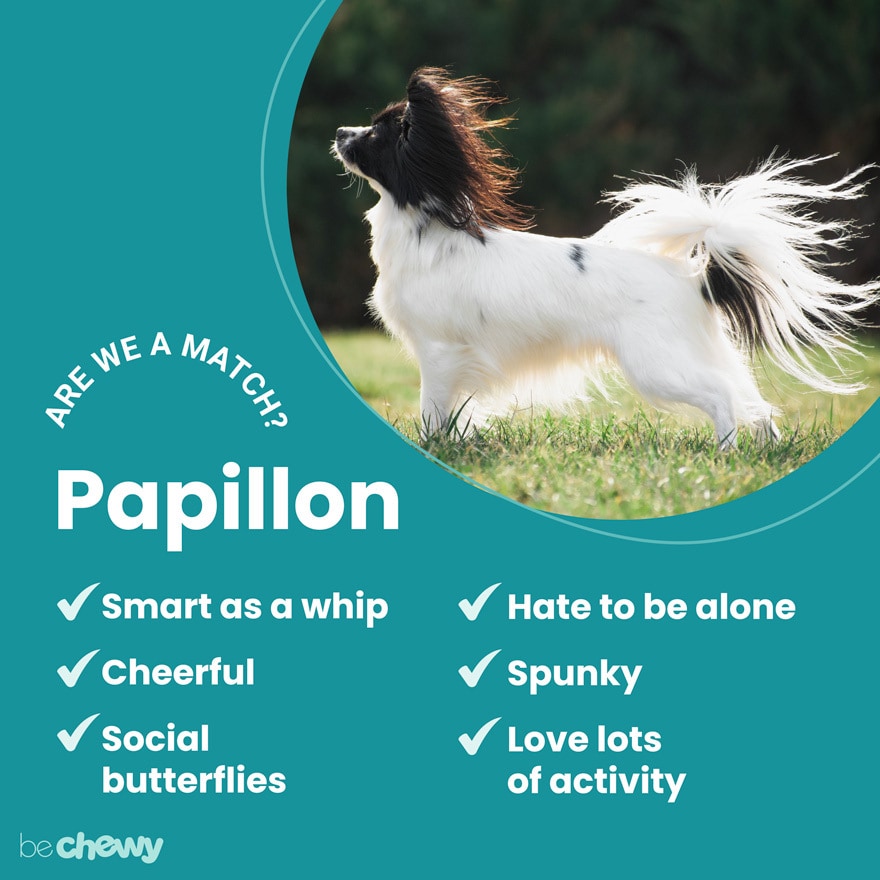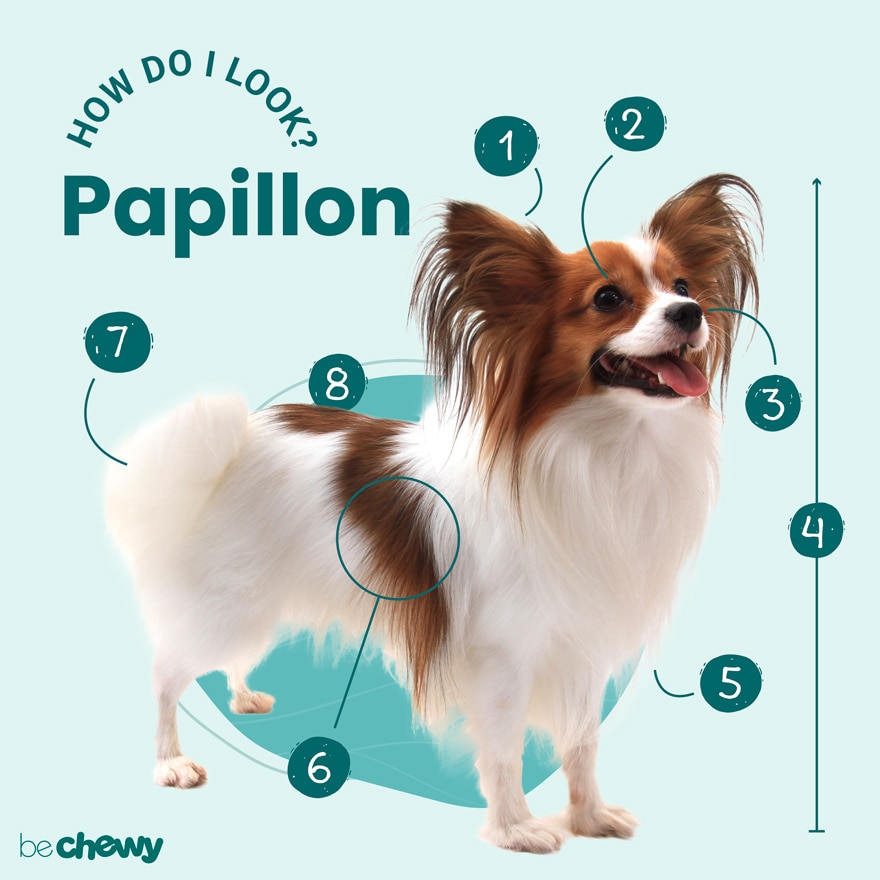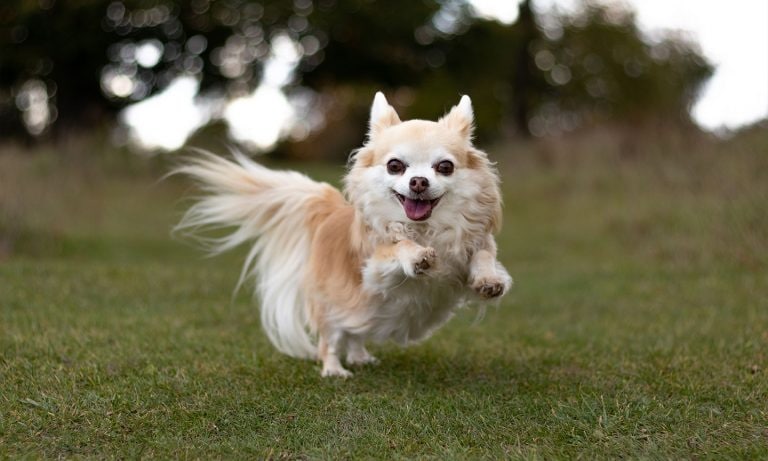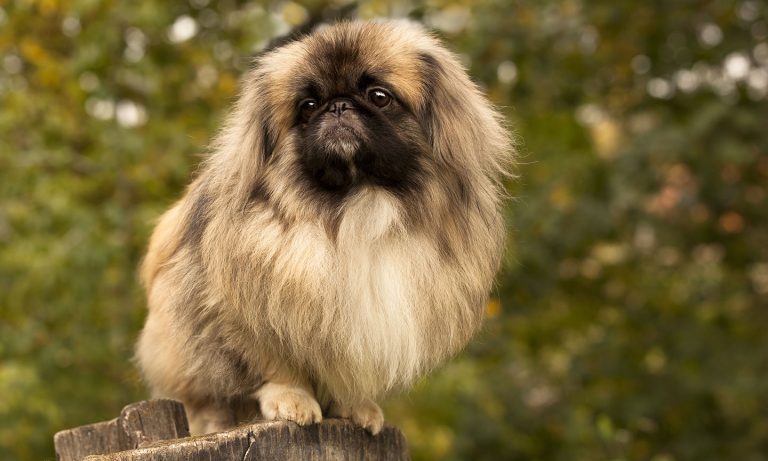Papillons were born to be the life of the party—and bonus points if the party’s outside. This outgoing breed has lots of energy to burn, so get your kicks ready—you’ll be spending your days going for walks around the neighborhood. Cheerful and confident, Paps are guaranteed to charm your neighbors as they make their rounds. Be prepared to make a lot of new friends with this adorable social butterfly by your side. Pap parents, we see a block party in your future, with you and your spunky pup at the top of the guest list.
Breed Snapshot
Temperament:
JoyfulLivelySocial ButterflyCoat Color:
White And BlackWhite And LemonWhite And RedWhite And SableWhite Black And Tan
Best For
Intelligent and full of energy, Papillons thrive with active pup parents who can provide physical exercise, mental stimulation, companionship and regular grooming (just look at that long, silky coat!). Because they're so small and adaptable, Papillons are well-suited for homes large and small.
Papillon Temperament
Papillons are energetic little dogs who love adventure. They are confident, outgoing and generally get along well with everyone when they’re properly socialized and trained. Without plenty of socialization, these tiny pups can grow up to be overly dependent on their pet parents, so it’s important when raising a Papillon puppy to introduce them to a wide variety of people, pets and situations to build their confidence. But once that confidence kicks in, watch out—Papillons don’t know their own size, and their spunky, fearless attitudes can get them into trouble with larger dogs who won’t put up with their tiny ‘tude.
This cheerful little breed loves to be the life of the party and does well with older children and cats. Their small size and fragility, combined with their overabundant confidence, makes them not so great with small, rambunctious children or larger dogs (even sweet and tolerant large-breed dogs could accidentally injure a tiny Papillon while playing). So, in addition to socializing and training your Papillon, teach your kiddos how to properly interact with pups.
How to Care for a Papillon
Surprise! Papillons may look high-maintenance, but their needs are a little more moderate than you might expect (especially when it comes to their grooming and daily exercise needs). They’re a breeze to train and happily light on grooming needs despite their long hair, and their happy attitudes make them a joy to care for no matter how much time and effort are involved.
Papillon Health
Papillons have a fairly long life expectancy of 14-16 years, but they are prone to some health issues. It’s good to know what those potential health problems are in advance, so you can keep your pup healthy for longer.
- Patellar Luxation: This is a common hereditary condition in which the kneecap pops in and out of place. Often, this is mild and can be managed with weight management and joint supplements; but in severe cases, surgery may be needed.
- Hypoglycemia: Low blood sugar is a common problem with toy breeds. Symptoms can include lack of energy, lack of appetite and, in severe cases, seizures. Feeding smaller, more frequent meals throughout the day can help avoid episodes of hypoglycemia.
- Dental Diseases: Dental diseases are another problem common in small breeds, thanks to smaller mouths that tend to crowd their teeth. Prevention is key! Frequent tooth brushing and annual dental cleanings can help keep their teeth healthy.
- Open Fontanel: Papillons are born with a soft spot in the top of the skull, which usually closes—much like in a newborn human baby. Usually, this closes within the first 9-12 weeks of age, but sometimes it remains open. There is typically no impact on everyday life, but it can be an issue if the pup has a head trauma.
- Progressive Retinal Atrophy (PRA): PRA is a hereditary condition that can cause blindness in dogs over time. While there is no cure, a genetic screening test is available—so be sure to ask your breeder.
Papillon History
The Papillon breed traces its origin to the time of the Renaissance when it became trendy among the nobility class to breed miniaturized versions of popular breeds. Spaniels were bred with toy breeds to produce these “dwarf spaniels,” which quickly became favorite lap buddies of royals and nobles throughout Europe. Walk into an art museum today, and you’re likely to see these dogs looking out at you from paintings of princesses and noblewomen by famous artists such as Rembrandt and Goya.
It wasn’t until the 17th century when a breeder in French King Louis XIV’s court developed a version of this breed with erect ears and gave it the name “Papillon.” These little dogs with the butterfly ears quickly became all the rage in France, where they were favorites of Madame de Pompadour and Marie Antoinette. They were further refined and popularized by breeders in Italy and Spain.
While not all varieties of this breed have erect ears, the perky-eared Papillon grew so popular that the entire breed eventually became known by that name and was registered as such by the American Kennel Club in 1915.
Wondering where you can get a Papillon today? You can find information about reputable breeders on the American Kennel Club website. Papillon puppy prices range from about $500-$2,000. But for that, you’ll likely get a pup who’s been vaccinated and screened for temperament and health issues and may come with pedigree papers. You can also find Paps in need of good fur-ever homes at a Papillon rescue or at your local animal shelter. Or, search Chewy’s database of adoptable dogs in your area.
FAQs
Are Papillons hypoallergenic?
No, Papillons are not hypoallergenic. Even though their shedding is low, it’s still enough to aggravate the symptoms of those with allergies.
What are the most popular Papillon names?
The most popular Papillon names are Abercrombie, Adele, Angel, Armani, Ash, Bandit, Beauty, Belle, Brie, Camille, Chanel, Coco, Charlotte, Chloe, Clay, Comet, Copper, Dove, Elle, Eagle, Emperor, Falcon, Felix, Finch, Gypsy, Holly, Jade, Jordan, Juicy, Kimono, Kiwi, Lady, Lark, Layka, Louis, Lucky, Luna, Milly, Monarch, Noel, Orchid, Oriole, Paris, Pearl, Pippa, Posh, Queen, Raven, Ralph, Robin, Skipper, Sophie, Starling, Stella, Sugar, Tiffany, Versace, Willow and Wren. Get more dog names.
How do you pronounce Papillon?
Bring out the baguettes and cheese! Papillon is a French word (meaning “butterfly”) that’s pronounced with the emphasis on the first and third syllables, and the double L makes a Y sound: pah-pee-yon.
Do Papillons bark a lot?
Yes, Papillons bark a lot. They make good alarm systems and will be sure to let you know when someone’s at the door. But they don’t generally sit around barking for no good reason.
Are Papillons cuddly?
Papillons are really cuddly when they’re all worn out. But if they’re not tired yet, they’ll be more interested in playing and exploring than in pets and cuddles.
What are the most common Papillon mixes?
The most common Papillon mixes are:
- Papillon-Chihuahua mix (Chion)
- Papillon-Pomeranian mix (Paperanian)
- Papillon-Poodle mix (Papidoodle)
- Papillon-Maltese mix (Papitese)
- Papillon-Corgi mix (Corillon)
- Papillon-Dachshund mix (Papshund)
Note: These are not purebred dogs but mixed breeds.

Top Takeaways
Papillons are bright, cheerful and energetic dogs. As a pet, this breed is great for anyone with the time and energy to take them on a fun outing. The facts are that a Papillon needs an alert and attentive pet parent who can look out for their safety and reign them in when their confidence outmatches their size. Portable, curious and outgoing, these tiny sidekicks are always ready to tag along on your next adventure.
Expert input provided by Dr. Sara Ochoa, DVM, veterinary consultant for DogLab; and certified canine behavior consultant and fearful dogs expert Rain Jordan, owner of Expert Canine and founder of The Fearful Dogs Project.
Breed characteristic ratings provided by veterinarian Dr. Sarah J. Wooten, DVM, CVJ, a veterinarian at Sheep Draw Veterinary Hospital in Greeley, Colorado; dog trainer and behavior consultant Irith Bloom, CPDT-KSA, CBCC-KA, CDBC, owner of The Sophisticated Dog, LLC, in Los Angeles; and certified animal behavior consultant Amy Shojai, CABC, in Sherman, Texas.
The health content was medically reviewed by Chewy vets.

Search for Adoptable Papillons Near You
Female Names
- Lucy
- Bella
- Luna
- Coco
- Lily
- Poppy
- Daisy
- Piper
- Rosie
- Sadie
Male Names
- Gizmo
- Louie
- Milo
- Bandit
- Oliver
- Finn
- Charlie
- Remy
- Leo
- Max
Share:













